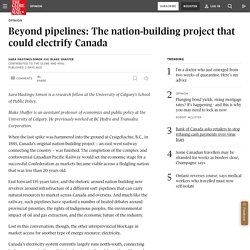

Recul à prévoir dans la transition - La Presse+ L’effondrement du prix du pétrole et la probabilité d’une récession à l’échelle mondiale donneront un coup de frein au mouvement de remplacement des énergies fossiles, qui avait pris de l’ampleur sur la planète.

La crise vient chambouler complètement la conjoncture, estime François Delorme, professeur à l’École de gestion de l’Université de Sherbrooke. « La priorité des gouvernements envers les changements climatiques vient de prendre le bord », dit le spécialiste en finances publiques. Les prix internationaux du pétrole sont maintenant sous la barre des 30 $US le baril, en raison du ralentissement économique mondial et de la guerre de prix que se livrent les principaux pays producteurs pour accroître leur part de marché. Avec la pandémie de la COVID-19, qui risque de précipiter l’économie mondiale dans une crise sans précédent, le prix de l’énergie fossile pourrait rester bas, et pour très longtemps.
5 Factors That Will Determine The Economic Impact Of Coronavirus. How Coronavirus Makes The Case For Renewable Energy. Reliance on fossil fuels has left countries more exposed to the economic shock of global crises like coronavirus, and governments should look to renewable energy to help reduce such risks, a leading financial economist has said.

Dr Charles Donovan, Executive Director of the Centre for Climate Finance and Investment at London’s Imperial College Business School, made the comments to Forbes.com at the end of a week that saw the confirmation of the COVID-19 coronavirus as a pandemic, along with an announcement by Saudi Arabia that it would increase oil supply at a time of declining demand. Solar power has been growing for decades. Then coronavirus hit. This story was originally published by Grist and appears here as part of the Climate Desk collaboration As the coronavirus outbreak rages on, renewable energy is taking a hit.

Factory shutdowns in China have disrupted global supply chains for wind turbines and solar panels, with consequences for clean energy progress this year around the world. The spread of COVID-19, now declared a pandemic by the World Health Organization, is expected to slow solar energy’s rate of growth for the first time since the 1980s. On Monday, two major solar panel manufacturers that supply the U.S. utility market, JinkoSolar Holding Co. and Canadian Solar Inc., both saw their stock prices fall by double digits.
Bloomberg New Energy Finance, a research firm, previously predicted that global solar energy capacity would grow by 121 to 152 gigawatts this year, but on Friday, the group issued a new report dialing back its prediction to just 108 to 143 Gigawatts. Cristal Union shifts from fuels to pharma-grade ethanol at Arcis plant in coronavirus response : Biofuels Digest. This news in from Cristal Union in France: “In the current context of an unprecedented health crisis, with an increasingly rapid spread of the Covid-19 virus, the Cristal Union Group has decided to stop the production of bioethanol at the Arcis distillery in Aube to redirect its production towards ethyl alcohol, labeled BIOCIDAL and PharmEthyl (alcohol intended for the pharmaceutical industry and biotechnologies).”

The group noted, “Cristal Union will continue to produce bioethanol in Cristanol, another large distillery of the Group, but in a smaller proportion. As part of its social responsibility, the Group is thus providing a concrete and immediate response to the explosion in demand for this type of alcohol, in particular for customers looking for disinfectant products, in a global market that is already very tense. OK, what’s the difference between ethyl alcohol and ethanol. Opinion: Beyond pipelines: The nation-building project that could electrify Canada. Sara Hastings-Simon is a research fellow at the University of Calgary’s School of Public Policy.

Blake Shaffer is an assistant professor of economics and public policy at the University of Calgary. He previously worked at BC Hydro and Transalta Corporation. When the last spike was hammered into the ground at Craigellachie, B.C., in 1885, Canada’s original nation-building project – an east-west railway connecting the country – was finished. The completion of the complex and controversial Canadian Pacific Railway would set the economic stage for a successful Confederation as markets became viable across a fledgling nation that was less than 20 years old. Fast forward 135 years later, and the rhetoric around nation-building now revolves around infrastructure of a different sort: pipelines that can carry natural resources to market across Canada and overseas. But that may be changing. However, the way in which we speak about connecting our provincial power grids doesn’t help. Mining giants BHP, Anglo and Fortescue join forces for "green hydrogen"
Un procédé utilisant de la rouille rend la production d’hydrogène 25 fois plus efficace - Transitions & Energies. Défis et promesses de la numérisation et des nouvelles technologies - Le magazine Électricité Plus. Calgaryherald. Construction of Canada’s largest solar farm in Alberta is poised to proceed with the infusion of $500 million from a Denmark-based investment group.

The decision by the world’s large renewable energy fund, Copenhagen Infrastructure Partners, to bring global investors into the 1,900-hectare project on farmland near the village of Lomond in Vulcan County is a watershed for the industry, said Dan Balaban of Calgary-based Greengate Power Corp. We apologize, but this video has failed to load. “This show of confidence is great news for Albertans . . .